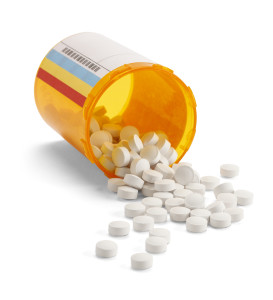 In order for medications to be successful, we often have to overcome substantial side effects. As we weigh the benefits of a medication against its side effects, we must consider the seriousness of the underlying disease and our options for alternative treatments. Idiopathic pulmonary fibrosis is a progressive disease that in the absence of treatment progresses to respiratory failure. Against this background we consider how to manage the common side effects of Esbriet (Pirfenidone).
In order for medications to be successful, we often have to overcome substantial side effects. As we weigh the benefits of a medication against its side effects, we must consider the seriousness of the underlying disease and our options for alternative treatments. Idiopathic pulmonary fibrosis is a progressive disease that in the absence of treatment progresses to respiratory failure. Against this background we consider how to manage the common side effects of Esbriet (Pirfenidone).
The first challenge with Esbriet is the three times daily dosing regimen. The medication has not been shown to be effective with less frequent dosing. The best way to remember to take middle of the day medications is to set your phone’s alarm. We are now tied to our cell phones so we can take advantage of them as a memory aid. Find a routine that works for you. Most patients take their Esbriet with meals. There is a gradual up-titration process of increasing from 1 pill three times a day to 3 pills three times a day. The gradual up-titration is important to avoid dramatic gastrointestinal side effects such as diarrhea.
Gastrointestinal Side Effects of Esbriet
The most common side effects are nausea and diarrhea. About a third of patients in the clinical trials experienced nausea. Simple measures such as taking the pills with food can help. If nausea is severe, anti-nausea medication may be very helpful. For most patients, nausea gradually improves with time. If nausea is severe, decreasing the dose may be effective. Once nausea improves, the dose may be increased again.
About a quarter of patients in the clinical trials experienced diarrhea. For most patients this is mild to moderate and can be dealt with by taking over the counter medications such as Imodium. If the diarrhea is severe then we recommend decreasing the dose and trying prescription anti-diarrheas such as Diphenoxylate-Atropine (Lomotil). A small percentage of patients experience very severe diarrhea even at low doses. For these patients we generally stop Esbriet.
Heartburn is a fairly common side effect. If the symptoms are mild, calcium carbonate may be adequate. If heartburn symptoms are frequent or severe, then acid suppressing medications are often very helpful. We generally start with over the counter H2Blockers such as Famotidine (Pepcid) or Ranitidine (Zantac). If symptoms persist, then we escalate to proton pump inhibition with Omeprazole (Prilosec) or one of the other agents in the family. Avoiding alcohol, caffeine, citrus, late meals and spicy foods is also helpful.
Sun Sensitivity and Rashes with Esbriet
About a third of patients taking Esbriet in the clinical trials in North America developed some type of rash. In my experience this has been most dramatic in patients that had substantial direct sunlight exposure. The best strategy is prevention. Patients should use sunblock (SPF at least 50 or higher) and wear long-sleeves when outside Avoid direct sun exposure. Large-brimmed hats are also very important. There are special UV-Blocking long sleeve shirts that provide added protection. In patients that do develop a severe rash, we generally stop the medication until the rash has resolved. We consider re-challenging with Esbriet if the rash was sun exposure related. If the rash was very severe and not related to sun exposure then we may choose not to re-challenge. If we do re-introduce the medication, it is re-titrated starting at 1 pill three times daily. For patients that do develop severe rash, we have had some success treating with prescription topical steroids.
Other Side Effects of Esbriet
Patients may experience fatigue, headaches and dizziness. These side effects usually improve with time. If the symptoms are severe, then we decrease the dose. If there is no improvement, then we stop the medication until the symptoms resolve and then re-challenge.
In the clinical trials, a small number of patients developed elevated liver enzymes. As a result, we check blood work monthly for the first six months and then quarterly thereafter.